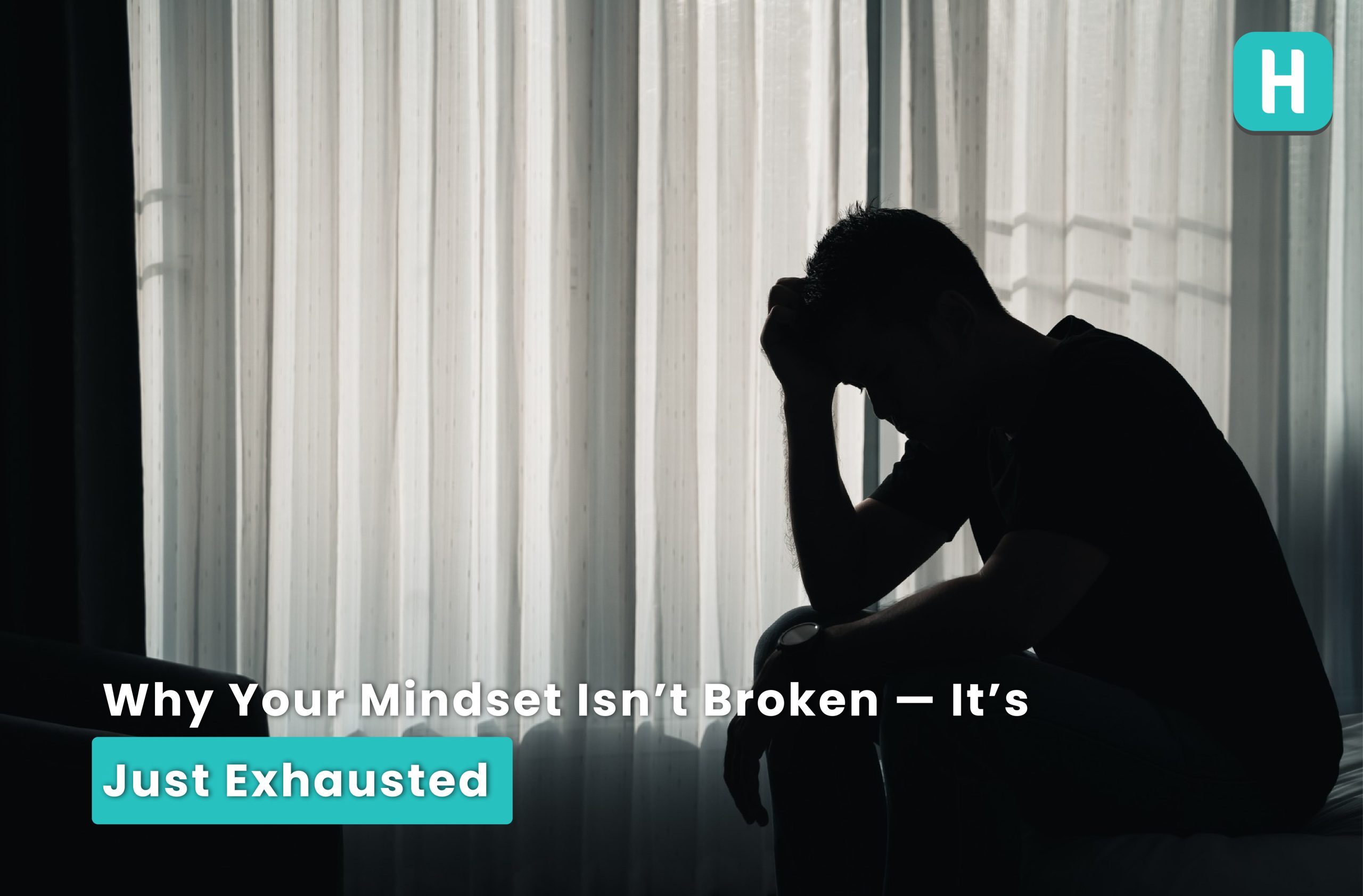Why Your Mindset Isn’t Broken — It’s Just Exhausted
I Used to Be the Strong One… So Why Can’t I Even Reply to a Text Anymore?
Let’s start with a feeling no one talks about:
You used to handle everything — deadlines, family drama, crisis after crisis — like a superhero with a to-do list.
But now?
Just reading a message feels like too much.
Opening your laptop feels like running a marathon.
You’re staring at your coffee, wondering if it’s you… or if something inside just gave up.
Here’s the truth:
You’re not lazy. You’re not broken. You’re just mentally exhausted.
And this kind of exhaustion doesn’t go away with sleep. It burrows into your bones, your brain, your heart — until even things you love start to feel like chores.
This isn’t weakness. This is overcapacity.
Let’s talk about it.
This Is the Burnout No One Sees
Mental exhaustion is silent. You can’t post about it. You can’t explain it in one sentence. You just quietly stop functioning.
- You smile in meetings, but your brain is foggy.
- You show up for family, but you’re on autopilot.
- You make it through the day, but you’re not living — just surviving.
Now here’s the kicker:
- According to WHO, burnout is now classified as a chronic condition. And the number of people struggling with it? Over 75% of professionals have experienced mental exhaustion — but most didn’t even realize it.
Why? Because we don’t know how to spot the signs of mental exhaustion vs burnout.
So let’s break it down in plain human language:
Is It Just Burnout… or Mental Exhaustion?
| You Might Be Burned Out If… | You’re Mentally Exhausted If… |
| You feel unmotivated at work | You feel unmotivated everywhere |
| You hate your job | You feel numb, even about things you love |
| You feel cynical or detached | You feel fragile and drained |
| Rest helps a little | Even rest doesn’t recharge you |

Mental exhaustion hits deeper. It attacks your identity. Your energy. Your joy.
But the good news? It’s reversible.
Let’s Be Honest — Your Self-Care Routine Is Not Working
You’ve probably heard advice like:
- “Take a bubble bath!”
- “Light a candle and journal!”
- “Go for a walk in nature!”
Let’s stop right there.
When your brain is running on fumes, those Pinterest-perfect self-care tips won’t save you.
What you need is soul-level repair.
You need self-care routines for mental exhaustion that are less about aesthetics — and more about survival.
Let’s rebuild that self-care system from the ground up.
Mental Exhaustion Symptoms and Solutions You Shouldn’t Ignore
Let’s make it crystal clear:
| Symptoms | Solutions |
| You snap at small things | Pause, breathe, remove triggers |
| You forget things often | Rest your brain. Sleep. Say no to new tasks |
| You feel numb or disconnected | Ground yourself — music, movement, or mindful silence |
| You wake up tired every day | Check your boundaries, not just your mattress |
 Self-Care: Survival Mode Edition
Self-Care: Survival Mode Edition
- Emotional Whiteboard
Write down everything that’s living rent-free in your brain — to-dos, fears, decisions. Get them out of your head. Your mind needs space, not pressure.
✍️ “If you don’t empty the cup, it’ll overflow. Every. Single. Time.”
- 90-Minute Phone Blockout
Your phone is not a break — it’s a drain. Block out 90 minutes a day where you’re unreachable. No scrolling. No updates. Just stillness.
Harvard research says digital noise increases cortisol by 30%. Silence heals. Fast.
- Permission to Do Nothing
Yes — nothing. Not productive rest. Not “resting while cleaning.” We mean lying down and staring at the ceiling if that’s what your body wants. No shame. No guilt.
- Tiny Joy Missions
You don’t need a big vacation. You need one tiny joy every day. Pet a dog. Watch a comfort show. Cry to a sad song. Find your spark again — even for 10 minutes.
These aren’t luxuries. These are survival strategies.
Why Do I Still Feel Like This?” — When Exhaustion Becomes Identity
If you’ve asked yourself, “Why am I like this now?”
If you’ve secretly Googled How to fix a tired mindset…
It’s because you miss the old you. The version who could keep going. Who could bounce back.
But here’s the twist no one tells you:
You don’t need to go back. You need to move forward — differently.
The way to rebuild a broken mindset isn’t hustle, hustle, hustle. It’s slow healing. Compassionate boundaries. Saying no without guilt.
And maybe for the first time ever… letting yourself be enough even when you do less.
What Does Mental Exhaustion Look Like? Here’s the Ugly Truth
Let’s call out what society never does.
Mental exhaustion symptoms are sneaky. And they often look like:
- Crying over small things
- Hating your own voice in a meeting
- Feeling sick but nothing shows up in your reports
- Sleeping but waking up tired
- Avoiding people you love
- Snapping at your child and immediately feeling like a bad parent
If you recognize these signs — you don’t need a productivity app.
You need a rescue plan.
The Healing Begins With Brutal Honesty
Here’s how to rebuild a broken mindset — one unglamorous step at a time:
- Say it out loud: “I’m exhausted, not broken.”
- Cut the noise: Unfollow accounts that make you feel behind.
- Replace “What’s wrong with me?” with “What happened to me?”
- Let someone in: This could be a therapist, a coach, or even a friend. Healing starts with being seen.
- Reclaim your time: Schedule nothing. Literally block out time for nothing.
You don’t need more motivation. You need more nourishment.
Helply Isn’t Just Therapy. It’s a Soft Place to Land.
If you’re tired of pretending you’re okay…
If you’ve tried self-help books and still feel stuck…
Helply is here to remind you: healing doesn’t have to be lonely.
We match you with real therapists who get it. Who won’t say “Just be more positive.” Who understand mental exhaustion, not just burnout.
- Online sessions that fit your schedule
- Support for working moms, overwhelmed dads, quiet creatives, overthinkers
- A space to fall apart — and rebuild
Because you’re not crazy. You’re just carrying too much, for too long, without rest.
You Don’t Need Fixing — You Need Breathing Room
You’re not falling behind. You’re waking up.
You’re not losing your spark. You’re pausing to protect it.
Your mindset isn’t broken — it’s just begging for a reset.
So breathe. Log off. Turn inward.
You are allowed to rest — deeply, loudly, and unapologetically.
FAQs
Q1. Can mental exhaustion mimic depression?
Yes. But they’re not the same. If things you used to enjoy now feel like work, and even basic tasks exhaust you — it’s time to reset, not self-blame.
Q2. How do I rebuild a broken mindset when I have no time?
Start with 5-minute blocks. Journal. Breathe. Cry. Whatever helps release pressure. You don’t need an hour. You need intention.
Q3. What are the most powerful self-care routines for mental exhaustion?
Emotional offloading, tech-free time, permission to rest, and joy-based habits. And therapy — the kind that feels like someone finally understands you.
Q4. Can I really heal from this?
Yes. But healing doesn’t look like being the old you. It looks like becoming someone softer, wiser, and more in tune with your own energy.


